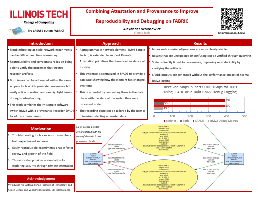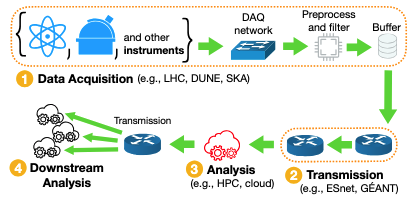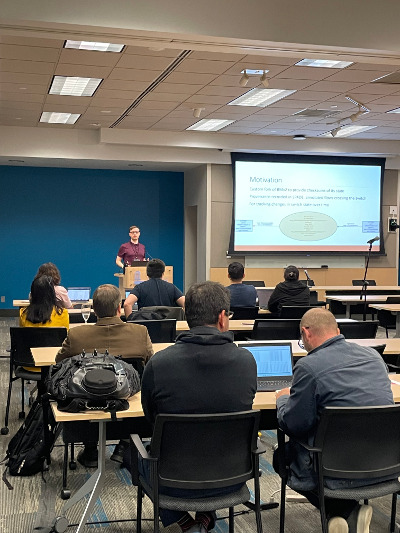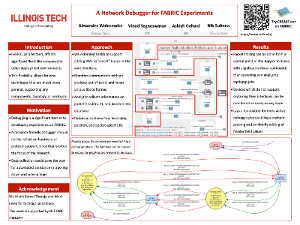 CREASE Project
CREASE Project
The CREASE project ("Causal REasoning and Attestation for Scientific Experimentation") improves the debuggability, diagnosticability and reproducibility of programmable network experiments on research testbeds. As a concrete output, we are building a prototype that works on the FABRIC testbed. The project has only just began, and more information will be posted as the project progresses. To stay updated, join the CREASE mailing list.
FABRIC Webinar about P4 programming
July 2024: The CREASE project was outlined as part of the FABRIC Webinar on 7/16/2024. This webinar formed part of FABRIC's series on Stitching Together Innovation with FABRIC Users. You can watch the webinar's recording. Materials from the webinar will be made available in CREASE's first beta release.
First beta release!
August 2024: The first beta of CREASE and an example experiment are now available! CREASE is designed to be easily usable by FABRIC users with their existing experiments, and to provide FABRIC users with observational and logistical advantages when carrying out experiments involving programmable networking. To find out more, join the CREASE mailing list.
KNIT9 and MERIF 2024

September 2024: See Nik's presentation about CREASE, and Alexander's poster that accompanied his demo. During KNIT9 and MERIF 2024 we also surveyed attendees about their use of testbeds, and their needs around debugging and diagnostic tooling on testbeds.
Second beta release!
October 2024: The second beta of CREASE has improved features, stability, and usability. To see CREASE in action, simply upload the updated example notebook to FABRIC and run it. If you have any questions, please reach out on the CREASE mailing list.
CREASE in fablib!
November 2024: It's now even easier to use CREASE, since its code has been upstreamed to fablib — it's immediately usable in FABRIC's JupyterHub if you pick "bleeding edge" or "beyond bleeding edge", and will be included in the next official released of fablib. We have an exciting roadmap of features and examples — stay tuned!
CREASE has a blog!
November 2024: Our first post describes what's different about the CREASE project when compared to other research projects, and gives examples of some of the challenges that we encounter.
First use of CREASE in other work

November 2024: CREASE was used to replicate some of the work in our HotNets'24 paper on FABRIC.
CREASE Demo Artifact
December 2024: The CREASE demo is now available as a FABRIC Artifact that works with the CREASE code in fablib. You can download this artifact directly into your FABRIC project -- to see how, see the KnowledgeBase article on Artifacts.
Break-out at PI meeting
March 2025: At the CIRC&CNS MRI Principal Investigators Meeting, Nik co-chaired a break-out session on Infrastructure Support & Applications for Cyber Infrastructure with David Balenson (USC ISI). Thanks to the 17 participants in this break-out for the interesting discussion, and to the meeting organizers!
LATTE'25
March 2025: Alexander discussed ongoing work at LATTE'25. This work significantly extends the performance of CREASE prototypes, and it is extending debuggability across different types of devices on FABRIC.
Experiments-as-Tools
April 2025: The second post on the CREASE blog describes a unifying theme that's emerging from our FABRIC-related research. This post is based on the keynote that was given at KNIT10.
CREASE in Class
July 2025: We recently used CREASE tools in the classroom for the first time! Read this blog post by Alexander about the preparation and outcomes of that process.
Testbed Consistency
September 2025: Alexander led a study on measuring network consistency, in which a metric was devised and evaluated on FABRIC and on a local testbed. The paper on this was accepted at INDIS'25, and we look forward to discussing it with the research community. See also the FABRIC artifact.
KNIT11
October 2025: Alexander prepared some great tutorial materials and slides for KNIT11 (the workshop of the FABRIC testbed) and gave a demo. These feature several improvements that were done to the system since our last presentation at KNIT, and benefits from feedback we received during our user study.
Tutorial

October 2025: In case you weren't able to attend the CREASE demo or the interactive tutorial at KNIT11, you can view the recording and use the tutorial materials linked from the prevous entry on this page (titled "KNIT11").

